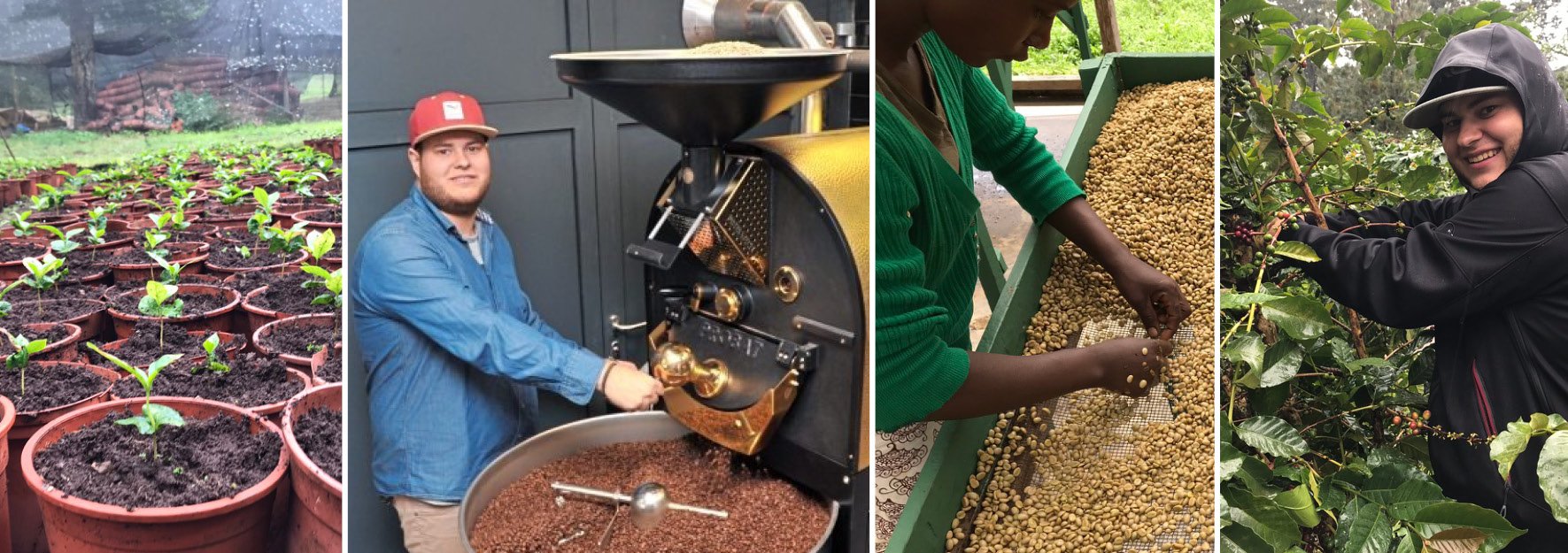
Roaster visits organic farm
Coffee is not equal to coffee. Joshua Gnoth knows this very well. The 26-year-old Papenburger is the plant manager and roaster of the Kanne roastery in Heede – a probably unique profession in northern Emsland. Since 2015, kanne has roasted around 50 tons of coffee per year.
“We mainly use organic coffee, which is also traded fairly,” says Gnoth in an interview with our editorial team. The coffee beans come to Heede from small organic farms from all over the world. They are directly imported varieties of raw coffee from Central and South America (Mexico, Peru) as well as from Africa (Tanzania) and Asia (Papua New Guinea). According to Gnoth, Kanne supplies the majority (about 70 percent) of the hospital gastronomy in Germany. The rest will be produced for the Kannelloni restaurant, delivered to restaurateurs in the region and beyond, and distributed through an online shop.
At the foot of Kilimanjaro
“We buy especially from selected farms. That means we know exactly which farms our coffees come from,” says Gnoth. The network was set up by the company through a coffee retailer in Hamburg. Gnoth himself was last in Tanzania for a week, more precisely on a coffee farm at the foot of Kilimanjaro, The highest mountain massif in Africa in the north-east of the country at 5895 meters. There, Gnoth says he has gained a personal impression not only about the production from the cultivation of the coffee plant to the bean harvest. He also wanted to get a feeling and a different appreciation for the coffee. “I’ve also seen how much work is behind it.” As he noted, every step of production is manual work. “Only the transport of the beans from the field is done by a tractor.”
Get taste from every bean
Gnoth explains his own passion for coffee, which goes far beyond working with the bean, with the variety of tastes. “Coffee can be twice as many flavors as wine,” he says. Depending on the region and weather conditions, the natural product tastes different. “Working and playing with it makes it so fascinating.” His employer certifies Gnoth to know exactly how to get the best taste out of each bean. He is certified as a coffee sommelier by the Chamber of Commerce and Industry.
In addition to roasting, one of the main tasks of the Papenburger is to buy the raw coffee beans and check whether the taste profile is fulfilled. For example, he had to determine whether the beans might be infested by insects or stored too moist.
On the basis of the green bean, however, it is not possible to indent the taste. “She’s rather grassy,” says Gnoth, explaining that the bean is the core of the coffee cherry. The taste only develops during the roasting process. Beans for espresso, for example, are roasted at 220 degrees Celsius for about 20 minutes.
Germs in river gravel
During his visit to the farm in Tanzania, he watched the bean of a coffee plant germinate in river gravel and, after about two months, is potted for a year and continues to grow under shade nets. It is then planted on a field at an altitude of about 1600 meters, just below the Kilimanjaro National Park. “It takes about three years for a plant to bear fruit for the first time,” says Gnoth. The harvest is done by hand. According to him, the pickers receive 2000 Tansan shillings per bucket. That’s the equivalent of 80 euro cents. One picker delivers between three and four buckets per day.
According to Gnoth, sorting the harvested coffee beans is also manual. They are later removed from their parchment skin and bottled and shipped in 60-kilo jute bags.
Source:
Picture: Gerd Schade/Joshua Gnoth / Emszeitung 29.08.2017

